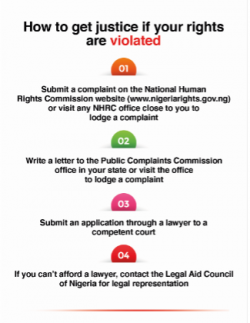Access to justice in Nigeria: The Fundamental Rights Enforcement Procedure and other means of defending human rights
Which options are there available to people in Nigeria?
There are two main option for those available to people in Nigeria who seek to enforce their rights, judicial enforcement and non-judicial enforcement.
Judicial enforcement refers to the process of using the courts to ensure that the government or others respect human rights law.
Non-judicial enforcement refers to other non-court-based steps to ensure respect for human rights.
Introduction

The efforts to tackle Human Rights abuses which are prevalent in African region especially in Nigeria has received a boost due to the recent introduction of the new Fundamental Rights Enforcement Procedure rule of 2009.
It serves as the procedural rule for the enforcement of Human Right cases.
Scope of the Guide
This guide is designed to help you know more about the Fundamental Rights Enforcement Procedure Rules of 2009.
It also aims to explore the rights you can enforce under this Rule, and how you can enforce these rights in court.
It also examine the challenges you may face while enforcing your rights and the remedies available to you when these rights are violated.
It is important to understand that the laws in Nigeria change over time. While this guide provides you with practical steps of enforcing your rights, it is not legal advice and it is important for you to seek and get legal advice from a lawyer or support organisation if you need specific advice.
Contributors
This guide was put together by a team of Lawyers, CSO experts and Law students in Partnership with NULAI and sponsored by Action4Justice.